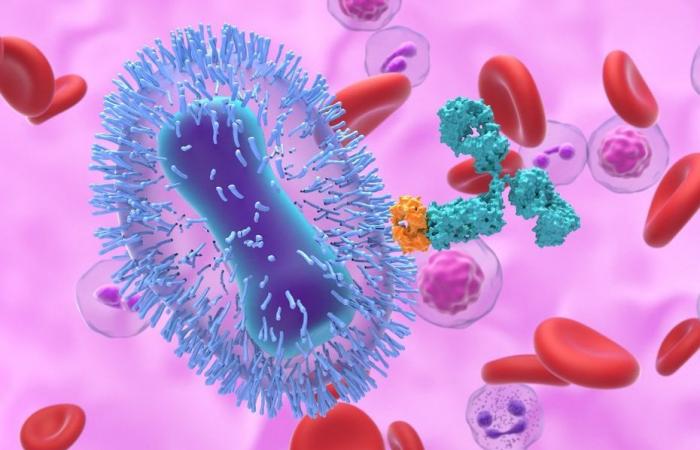
Mpox, monkeypox, new variants… the first case of the new variant, Clade1b, was detected in France this Monday. If it does not worry infectious disease specialists, it underlines the importance of vaccination for people at risk. We explain what you need to know about this virus.
Company
From daily life to major issues, discover the subjects that make up local society, such as justice, education, health and family.
France Télévisions uses your email address to send you the “Society” newsletter. You can unsubscribe at any time via the link at the bottom of this newsletter. Our privacy policy
A first case of the clade 1b variant of mpox was detected in France, three weeks ago, at Rennes University Hospital. The patient, who did not travel to Central Africa, was contaminated after contact with two people returning from this region. She was not hospitalized and her health is good. “We are not concerned about a potential risk of large-scale transmission of the virus” declared the head of the infectious diseases department at Rennes University Hospital, Pierre Tattevin.
However, health authorities are increasing their vigilance with this new variant, identified so far in the Democratic Republic of Congo. mpox, singpox, variants: here are 5 to understand everything.
Case of new Mpox variant in France. “We are not worried”, no risk of a general epidemic according to these infectious disease specialists
What is mpox?
It used to be called “monkey pox”but the French and international health authorities no longer want to use this expression, because it gave rise to racist comments during the outbreak of the disease. “Mpox” is however the contraction of “monkey pox” in English.
This viral disease manifests itself mainly by fever and the appearance of skin lesions, called blisters.
Largely confined to around ten African countries since its discovery in the 1970s, the disease has spread in 2022 to the rest of the world, including in developed countries like France.
Historically, mpox is best known for being transmitted through contact with animals, particularly through the consumption of contaminated flesh. But recent epidemics also seem linked to contamination from one human to another, particularly during sexual intercourse.
What is changing?
Monday evening, health authorities announced that they had detected for the first time in France a version of the virus which differs from the one previously circulating in the territory.
We are talking about “clade” to designate the different families of the mpox virus. Since 2022, clade 2 has been circulating in France as in most countries where the disease has been detected outside Africa.
This time, it is a variant of the other large family, clade 1, which was spotted in a patient in Brittany.
Added to this is another subtlety: it is not the classic clade 1, present for decades in Africa, but a variant, clade 1b, much more recently identified in the Democratic Republic of Congo (DRC). This is why we are talking about a new variant.
Is it more dangerous?
There is currently no indication that this version of the virus would be more dangerous than the one that has been circulating for years in France.
Certainly, clade 1 is associated with higher mortality than clade 2. The first is currently causing an epidemic centered in the DRC and killed more than 1,000 people there last year with a mortality rate above 3%.
In contrast, the epidemic caused by clade 2 proved to be extremely lethal in countries outside Africa.
But these comparisons don't really make sense. These gaps are largely explained by the superior quality of care in developed countries.
They are also due to the profile of the patients: in Central Africa, they are frequently malnourished children, often contaminated directly through animals. In developed countries, they are almost exclusively adults, most often men infected during homosexual relations.
What is worrying?
The appearance of the new 1b variant, however, requires increased vigilance, firstly because many elements about its profile are still unknown.
Unlike its big brother, the classic clade 1, it strikes in the DRC – and in some neighboring countries – adults rather than children. It therefore seems that its mode of transmission is similar to that of clade 2, without knowing whether this depends on the circumstances or on intrinsic characteristics of this virus.
Its degree of contagiousness remains to be decided. But, a reassuring element: clade 1b has not given rise to new outbreaks in the European countries where it has been identified in recent months: Germany, Belgium, the United Kingdom and Sweden.
These were generally people who had just returned from Central Africa and had therefore been contaminated on site.
In the French case, on the other hand, the patient – who is doing well – had been in contact with relatives who had themselves traveled to the countries concerned.
What measures to take?
The detection of clade 1b in France is not a surprise for the health authorities, who had been preparing for it for months and in particular re-studied the vaccination policy.
Several vaccines, originally developed against smallpox, are effective against mpox. It remains to be clarified to what extent this effectiveness continues against clade 1b but, for the moment, the experts are rather confident.
The question arose of expanding preventive vaccination but the French authorities did not make this choice and the campaign remains focused on the profiles of people most frequently affected: homosexual men, prostitutes – men or women – and anyone working in places dedicated to sexual encounters.
Logically, vaccination also targets anyone who has recently been in contact with a reported case of mpox.





